Key takeaways:
- Spa resort travel in Thailand combines luxury with holistic wellness, allowing travelers to connect with local culture through traditional practices.
- Understanding and respecting cultural norms, such as the ‘wai’ greeting, enhances interactions and fosters deeper connections with locals.
- Mindfulness of personal space and traditional etiquette can significantly improve travel experiences, leading to a meaningful cultural immersion.
- Participating in local customs, such as communal meals and festivals, creates moments of unity and connection with the Thai community.

Spa resort travel overview
Spa resort travel offers a transformative experience where relaxation meets rejuvenation. I vividly recall stepping into a serene oasis in Thailand, the scent of jasmine enveloping me while soft music played in the background. Can you imagine the weight of the world simply melting away?
These resorts often blend luxury accommodations with holistic wellness treatments, creating a sanctuary for the body and mind. I remember the feeling of sinking into a soaking tub infused with local herbs after a long day of exploring; it was an invitation to indulge oneself in tranquility. What could be more restorative than that kind of self-care?
Moreover, the unique cultural elements embedded in Thai spa practices elevate this travel experience. Engaging with local traditions, such as learning about traditional Thai massage techniques, added depth to my understanding of wellness. Have you ever experienced something that connected you not just to a destination, but also to its people? That connection is what makes spa resort travel in Thailand truly unforgettable.
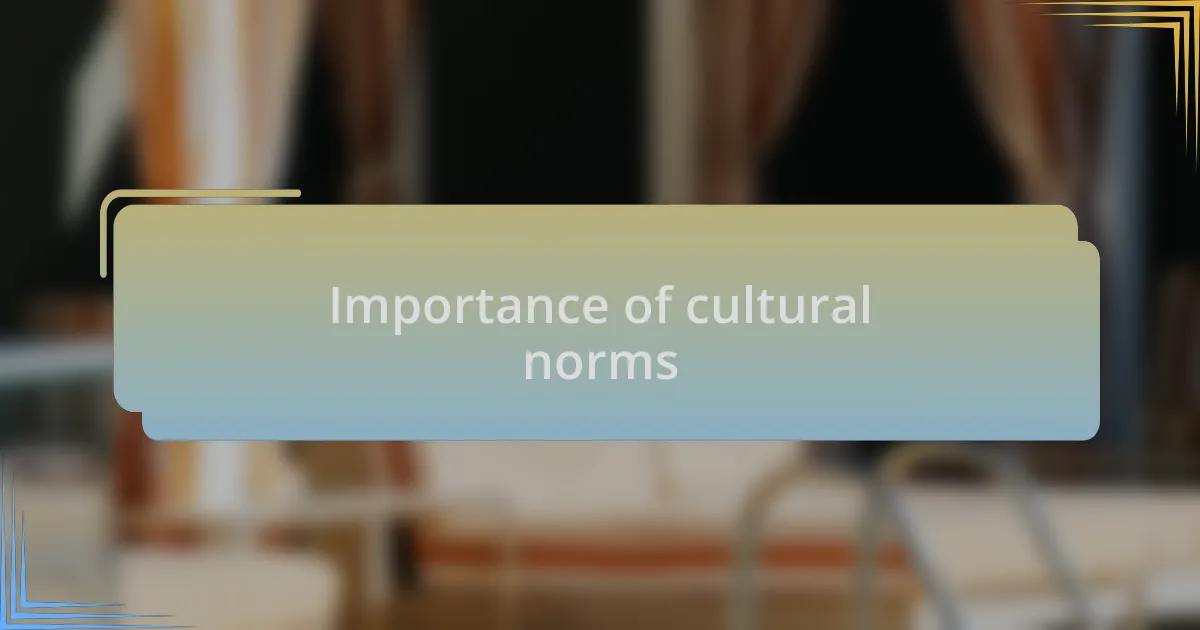
Importance of cultural norms
Cultural norms form the backbone of the rich tapestry that defines Thailand. During my travels, I quickly learned how critical understanding and respecting these norms were, especially in the context of a spa resort setting. For instance, bowing slightly with palms together in a ‘wai’ greeting is not just a formality; it’s an expression of mutual respect and acknowledgment of one’s presence. Have you ever paused to consider how a simple gesture can open doors to deeper connection?
In my experience, embracing cultural norms significantly enhances one’s enjoyment and understanding of local practices. I remember attending a traditional Thai spa ceremony, where the practitioners explained the significance of each step involved. It wasn’t just about relaxation—it was steeped in centuries-old traditions that celebrated physical and spiritual rejuvenation. Wasn’t it enlightening to realize that each treatment was linked to the heart of Thai culture?
Navigating cultural norms can sometimes feel overwhelming, but I believe it’s a vital part of travel that enriches the experience. It allows travelers like me to engage more meaningfully with local communities, bridging gaps and fostering goodwill. The moment I adapted to these practices, I felt a warm acceptance that transformed my trip from merely sightseeing to a profound cultural immersion. Have you ever felt that subtle shift from being a visitor to becoming part of a larger story?
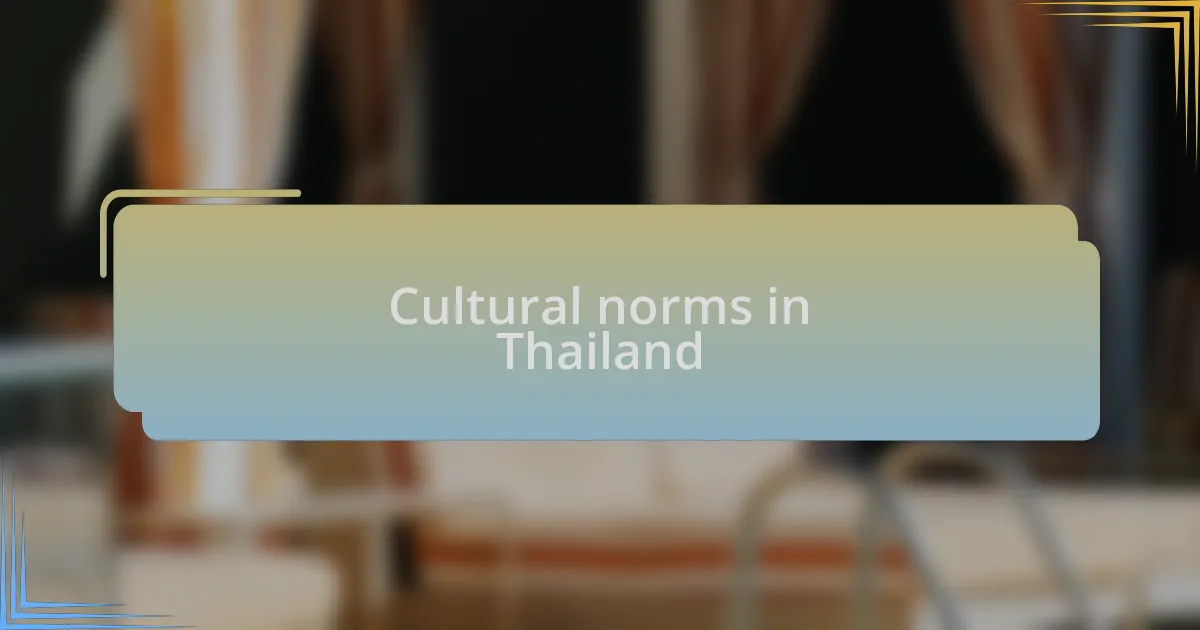
Cultural norms in Thailand
When in Thailand, it’s essential to appreciate the deeply rooted respect for the monarchy and Buddha. I recall being reminded gently by locals not to point my feet toward images of the king or Buddha, as it’s seen as disrespectful. This small act of awareness transformed my experience; I felt respected and accepted simply by adjusting my behavior to align with their traditions.
Being mindful of the concept of “face” is another enlightening aspect of Thai culture. I once witnessed a heated disagreement but, instead of escalating, the individuals involved maintained a calm demeanor, avoiding any public display of anger. It made me realize how important it is to handle conflicts gracefully, which is something that we can learn from, isn’t it? Embracing this philosophy helped me navigate social situations more smoothly during my stay, ensuring I left a positive impression.
Finally, the Thai approach to personal space and touch can be quite different from what many are accustomed to. I remember feeling a bit startled at first when friends would hold my arm while walking, a gesture of friendship and connection. It made me reflect on how relationship dynamics vary across cultures; what feels intrusive in one context can signify warmth in another. Have you ever been surprised by the way different cultures express friendship? Understanding these nuances really enhanced my connection with the locals and deepened my overall experience.
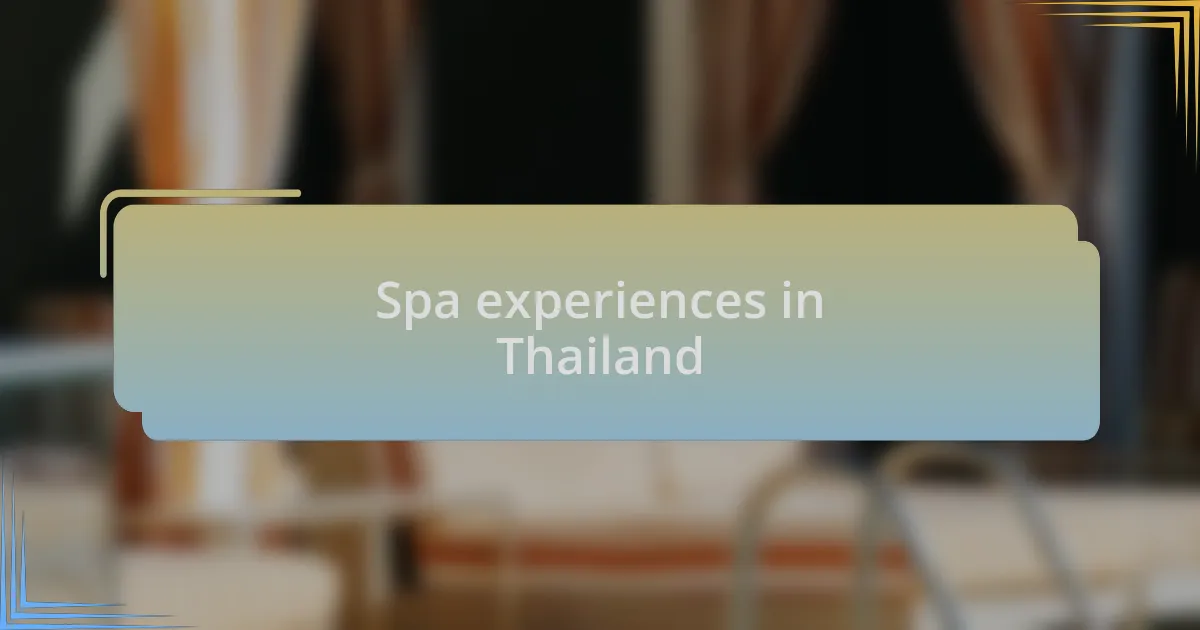
Spa experiences in Thailand
Spa therapy in Thailand is an experience like no other. When I visited a renowned spa in Chiang Mai, the moment I stepped inside, I was enveloped by the soothing scent of lemongrass and the calming sound of water fountains. Each treatment felt like a harmonious blend of ancient techniques and luxurious pampering, which left me utterly relaxed. Have you ever felt completely transported by a single scent?
What stood out to me most was the emphasis on holistic well-being. During a traditional Thai massage, the expert therapist used gentle stretches and acupressure techniques that addressed not just my physical tension but also seemed to enliven my spirit. I was amazed at how my stress melted away, making me wonder how often we overlook the healing power of such an immersive experience. Isn’t it fascinating how a simple touch can have such profound effects?
Visiting a spa in Thailand isn’t just about the treatments, either; it’s the overall ambiance that captures the essence of tranquility. I remember sipping herbal tea in a serene garden setting, surrounded by lush greenery. The attention to detail—from the decor to the soothing sounds—created an unforgettable sanctuary. Have you ever found a place that brought you such a deep sense of peace? Each visit to these spas enriched my journey, intertwining relaxation with the local culture in a beautiful way.
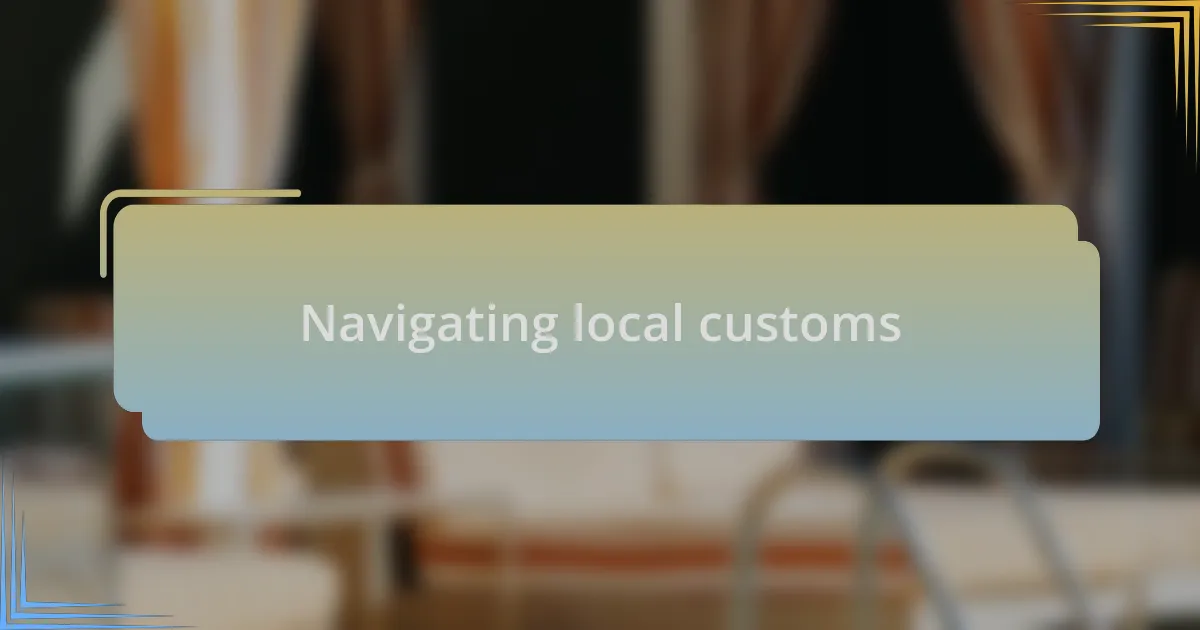
Navigating local customs
When navigating local customs in Thailand, I found it essential to approach interactions with respect and openness. For instance, while visiting a bustling market in Bangkok, I observed the informal greeting of a slight bow and a soft smile, reflecting the prevailing culture of gratitude and politeness. It made me realize how a simple gesture can build connections; have you ever felt welcomed by just a smile?
In my experience, understanding the significance of the Wai—the traditional Thai greeting—was invaluable. Learning to put my palms together in a gentle prayer-like position and giving a slight bow was met with warmth that instantly made me feel more integrated into the community. I can’t help but wonder: how often do we miss the chance to connect with local cultures by ignoring such simple yet profound practices?
Another memorable moment came during a visit to a local temple, where I was reminded of the importance of dress codes and etiquette. Wearing appropriate clothing and showing reverence was not just a rule but a way to honor the spirituality embedded in the setting. Each bow I made before entering felt like a mutual recognition of respect, prompting me to think—how does being mindful of our behavior change our travel experiences?
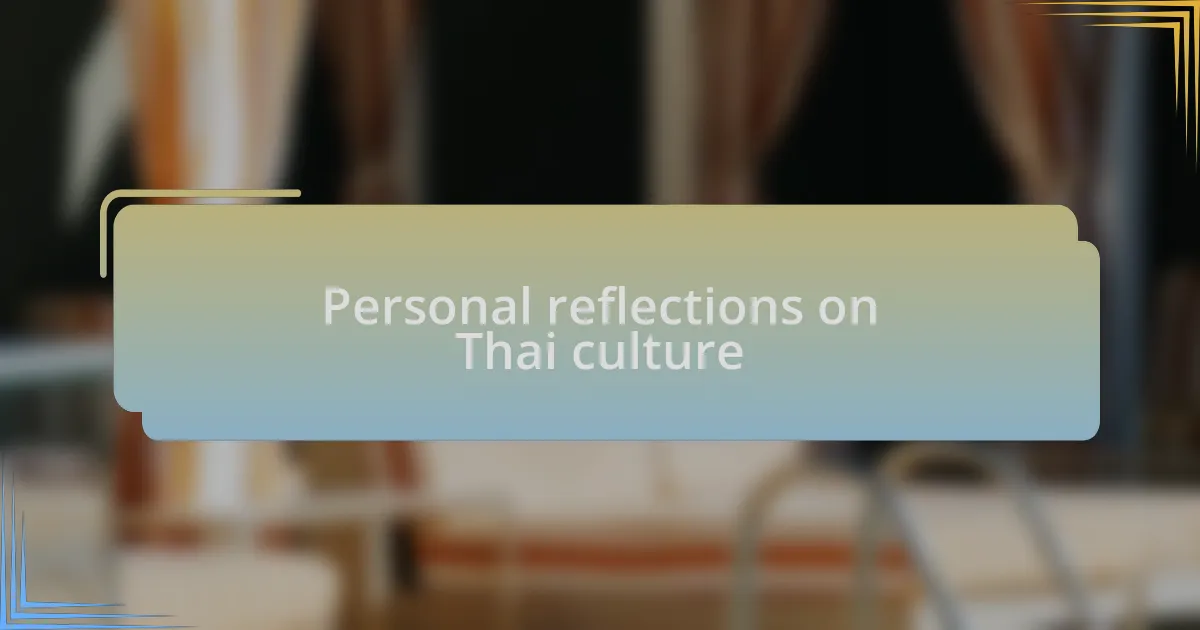
Personal reflections on Thai culture
As I continued to immerse myself in Thai culture, I couldn’t help but notice the deep sense of community that permeates daily life. One evening, while enjoying street food in Chiang Mai, I struck up a conversation with a local vendor. Her genuine enthusiasm for sharing her culinary secrets made me feel like part of a big family. How often do we encounter such warmth in our own lives?
Another striking aspect of Thai culture is the delicate balance between tradition and modernity. I remember wandering through the vibrant streets of Bangkok and coming across a temple nestled between towering skyscrapers. This juxtaposition made me reflect on how cultures evolve yet remain anchored in their roots. It raises an interesting question: can we celebrate progress while still honoring our origins?
Participating in a local festival was undoubtedly a highlight of my trip. The colors, music, and collective joy were contagious. As I joined in traditional dances, I realized how cultural expressions can unite people from different walks of life. It made me think—how often do we create moments that foster unity and celebrate our diverse backgrounds?
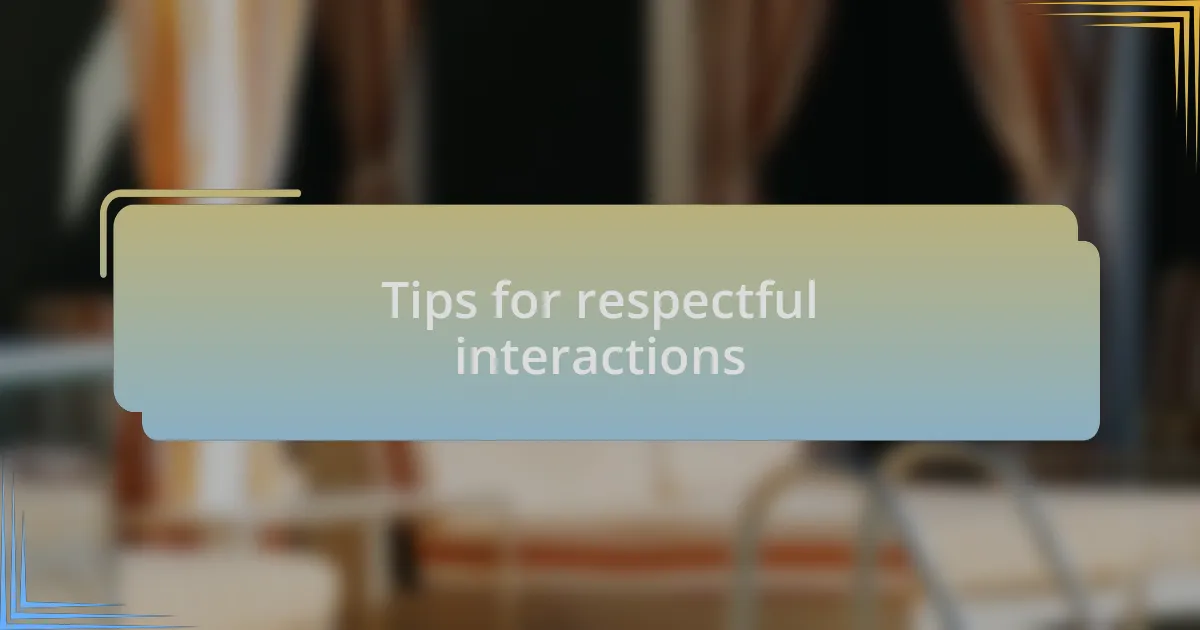
Tips for respectful interactions
When engaging with locals in Thailand, it’s essential to greet them with a respectful “Sawasdee” along with a slight bow, known as the “wai.” I remember the first time I did this; the smile on the vendor’s face in Ayutthaya lit up my day. It’s a small gesture, but it’s a powerful way to show that you honor their culture.
I’ve learned that physical contact, especially with the head, is often considered disrespectful in Thai culture. During a visit to a temple, I accidentally brushed against a child’s head while trying to navigate the crowd. The look of surprise and quick apology from their mother made me realize how crucial it is to be aware of personal space and physical boundaries. How often do we overlook these subtle cues in our own cultures?
Lastly, when dining with Thais, be mindful of the communal nature of meals. I vividly recall a meal where I began to serve myself before waiting for others to take the lead. The gentle laughter and polite ushering of the dishes reminded me that meals in Thailand are more than just food; they’re moments of connection and sharing. Have you ever paused to appreciate the deeper meanings behind your own dining experiences?